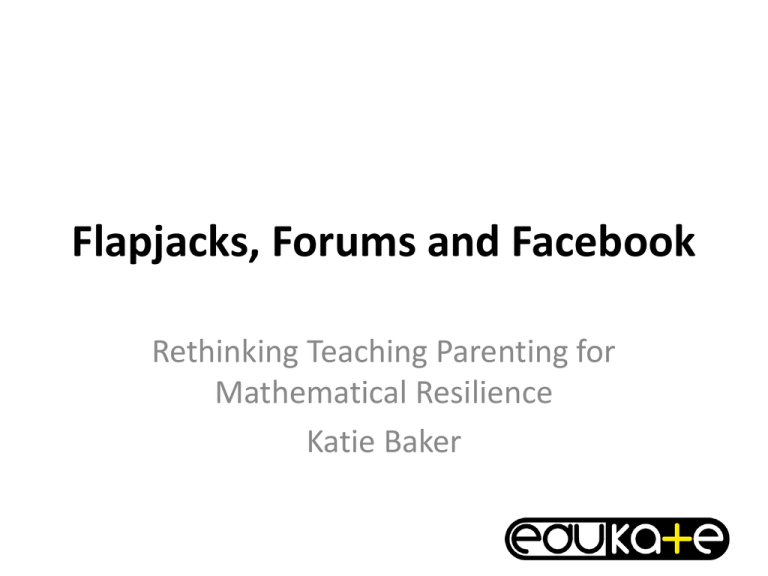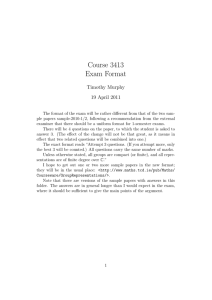Flapjacks, Forums and Facebook Rethinking Teaching Parenting for Mathematical Resilience Katie Baker
advertisement

Flapjacks, Forums and Facebook Rethinking Teaching Parenting for Mathematical Resilience Katie Baker The Background MY CV • Secondary School Mathematics Teacher • Lecturer at Coventry University and Coventry University College • One to One Support in Coventry University’s Sigma Maths Support Centre • Self-Employed Maths Consultant – Tutoring – Working with apprentices – Classes for parents on how to help their children • Parent For Maths First Aid Call EduKate! “a positive adaptive stance to mathematics which allows students to continue learning despite adversity” (Kooken et al 2012) Traditional assumptions about parental engagement Child + Parental Help = Child Does Better Child – Parental Help = Child Struggles Child + Parental Help = Child Gets Worse!! The Problem What they say when they hire me: What they say as they walk down the drive: It is so important for her to do well in maths. I was useless at maths at school. I really want to help him because he won’t get a job without maths but I don’t know how. I can’t do maths myself so I know where she gets it from. Oh algebra. I hated algebra. When are you ever going to use it anyway. Parents’ Time < Job + Homework+ Clubs + Family Time + Time to do anything about maths Parents’ Ability < Maths Homework expected by the teacher. Parent + Child + Maths Homework = Tears + Stress + Complete Family Breakdown! Parents + Child + Homework = “a completely different method from the one I taught them which has confused the child even more” Different Assumptions 1. If a parent doesn’t know how to help in maths rather than being a neutral influence they are actually being a negative influence. 2. Many parents need less to do not more. 3. Many parents (even ones who can do maths) do not feel confident to help with school maths. 4. I will only have one chance to engage with a parent and I want that engagement to make a difference to all the interactions they have with their child around maths for the rest of their life. 5. Many parents did not feel comfortable in the maths classroom the first time around and do not want to return. Different Methods If a parent doesn’t know how to help in maths rather than being a neutral influence they are actually being a negative influence. Parents need less to do not more. I tell parents what they need to stop doing. Different Methods Many parents (even ones who can do maths) do not feel confident to help with school maths. I will only have one chance to engage with a parent and I want that engagement to make a difference to all the interactions they have with their child around maths for the rest of their life. I teach about Mathematical Resilience rather than maths. Different Methods Many parents did not feel comfortable in the maths classroom the first time around and do not want to return. Any interaction takes place in a non-threatening environment. Different Outcomes? The Pilot • 4 parents – 3 Mum’s and a Dad all with at least 1 child in Year 1. • 4 sessions of an hour and a half, each one with a MR theme (Growth, Struggle, Value and Resources) - explicitly discussed. • All participants and their children measured before and after on the Kooken MR Scale and the Betz Maths Anxiety Scale What the participants said they gained • Increased awareness of what their children were learning at school. • Increased confidence in helping with maths. • Encouraged them to be more involved in helping with maths. • Gave them something to refer back to when working on homework with their children. The Results The Results The Statistics • Interactions with children around maths were up by 41%. • Related Samples Wilcoxan Signed Rank Test showed statistically significant difference between the children’s MR scores before and after the intervention, p= .017 • Children’s Mean MR Score increased from 79.5 to 89. What next? • Was this change in the children caused by the course? Need to do a trial with a control group. • Can it be replicated? • Will it be retained over time? Need to do a longitudinal study. Get involved: My Facebook Page (please sign up): https://www.facebook.com/promotingMR/ If you are a parent please could you complete my online scale here: https://coventry.onlinesurveys.ac.uk/parentsurvey Follow me on Twitter: @edukatemaths Email: bakerk11@uni.coventry.ac.uk

